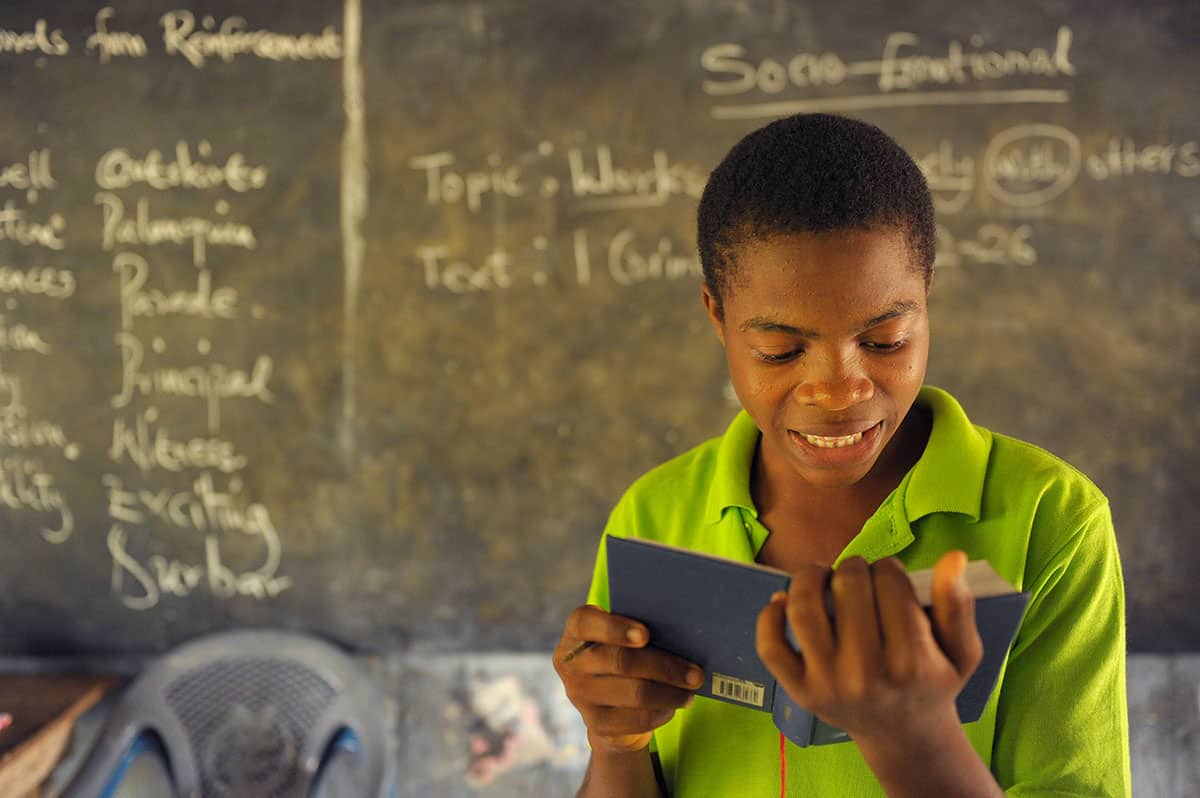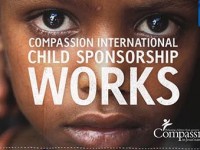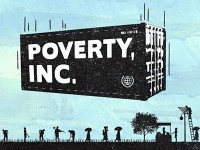What is Compassion International all about?
Well, first and foremost, we’re about Jesus. We are Christ centered. We “release children from poverty in Jesus’ name.” We work through the local church and live out our faith by extending care to others.

We demonstrate what we’re about in how we behave — what we do and how we do it.
We’re child focused. We develop children. Each child we serve is ministered to personally, and each church partner we work with tailors its programs to meet the specific needs of the children in its community. We help children in poverty become responsible, fulfilled adults. We give them an opportunity to succeed.
Sometimes meeting a child’s needs begins in the womb with a mother. And sometimes meeting a child’s needs means helping his or her whole community.

As we do this, we refute the lie of poverty and are that much closer to eliminating extreme poverty altogether.
But how we go about fighting extreme poverty contrasts with how other organizations work toward the same goal. We fight poverty personally, while many organizations fight it communally.
I don’t mean that other organizations aren’t personally invested or committed to eliminating extreme poverty. I mean that a child-focused, child development approach to fighting poverty is distinctly different from a broader, community development approach.

I believe that community development is important work, and I suspect that everyone at Compassion would agree it’s important.
At Compassion, we don’t agree that community development is the best approach to eliminating extreme poverty because over the years we’ve learned that changed circumstances rarely change people’s lives and changed people inevitably change their circumstances.
So, which method do you think is more effective?
What do you see as the strengths and weaknesses of each? Do the two methods complement one another or work against one another?
And if you had complete control over limited resources to use in the fight against poverty, how would you approach it? Would you focus on children, on communities or something else?
This was originally posted on June 15, 2010.







15 Comments |Add a comment
Great questions (and responses) on a subject we’ve all probably wrestled with. We sponsor children through Compassion and also two other organizations who take the more community-oriented approach so I guess I feel that both approaches are valid. Certainly it’s hard to argue against the value of building a well in a community, or building a facility to house a school, or helping to start micro-economic projects, or helping to repair homes following a major disaster. With our sponsorship of a child in the Compassion program I sense that my contribution goes more directly to benefit that child, and other children like her, whereas with the other programs my contribution will more likely benefit the families and/or people not even connected with the organization. But is one approach more valid than another in the eyes of Jesus? I suspect not.
How best to fight poverty? A billion dollar question! I think that both approaches are necessary, and I love Compassion’s holistic approach to the individual as well as Compassion’s work to step beyond simple child sponsorship — to include teaching/training for new mothers, to have an LDP program for young adults (who are no longer really “children”), and who knows what else may be in the works. The focus HAS to be on children and on Jesus, but it can move beyond simple child sponsorship
I think they are both great, but because of my involvement with Compassion, I’m probably more biased towards child development 🙂
One of the beautiful things about the body of Christ is we can function in different ways and approaches, yet at the same time we can all together serve the Lord well. As someone who has lived in Africa and Asia and is married to an African (I’m American), my only concern with an personal individual approach is that non-Western people don’t view themselves as individuals. They see themselves as part of the whole, whether it be family, clan or tribe/people group. So, to develop the person without also developing their larger community may become an obstacle to the one person’s development. My husband and I just finished degrees in community development, and we’re excited to move to a country in Africa to minister to and with people in communities there. But, in the end I say serve the Lord in the way or method that you’re passionate about and watch God transform people in amazing ways!
I’ve been teaching at the student centers this last 4 weeks and I’ve been amazed at how these students are learning. Just 2 days ago, a 10 year old little boy came up to me and showed me the divisibility rule of 7. I had never even heard of the thing!!! These 14 year old students are studying what University students are studying in the USA. At the same time, the projects are being run by churches. And as such, it is a ministry. It is not just helping the poor. It is a definite ministry. When I look at Christ’s life, He didn’t just go around helping poor people. He had a definite ministry in mind. When He did miracles, it was to authenticate His message, not just to help someone.
I also think that when a person sponsors a child, that that money should go to the development of that child not to developing the neighbourhood of that child. To me, it is an issue of integrity.
I’m so glad that Compassion has this vision. This is what makes me confident in the organization. And all the way from the CSP to the LDP, it is all about serving Christ and seeing the Great Commission fulfilled.
I wasn’t aware it was an either-or proposition.
Well the only reason I feel I can share a little is b/c I have seen how Compassion has helped me 😉 I really don’t know the effect it has on the kids I sponsor. Visiting my kids was amazing! And I will be visiting another in July 😉 I like Compassion b/c they have lots of bible verses and that’s what I need 😉 Jesus is the only WAY 😉 Without Jesus, no hope. I like how Compassion fights poverty 1v1 b/c it allows me to join my sponsor child on the battle field as one wise sponsor put it. I know if I don’t visit I can still join them but there’s just something about acually standing there that encourages my faith and I am sure theirs as well it just seems impossible is why I like it 😉 I know we have eternity to look forward to but why not have a few Holy Spirit exploits along the way! I am just so thankful for the prayers from my sponsor kids I value them GREATLY! I just like Compassion b/c it’s about Jesus and I feel I am doing the impossible everytime I visit some or one of my sponsor kids. And doing the impossible is fun b/c it’s impossible.
I’ve had people come to my personal blog wanting to debate this topic. I just share how Compassion works and how and why it’s effective in the lives of children, families, AND communities. Every time I’m asked to justify Compassion’s model I end up that much more in support of the organization. I always find some new information in my research that solidifies for me that Compassion’s way of working in communities is excellent.
I think a community-based approach is all well and good, but while that process takes time to grow and develop and take effect, there are vulnerable kids who are falling through the cracks.
That said, my biggest concern about Compassion is the 26% of kids who aren’t getting correspondence from sponsors. That’s one-quarter of the children in this program. And I have to ask, what kind of impact is THAT having on the children?
I really, really feel that Compassion needs to take leadership here and solve this problem and close that gap in some way. This topic ALWAYS comes up when people want to debate community-based vs. sponsorship. And they have a totally valid point. It’s the one negative of the program that I can’t explain away.
Is there ANY way that Compassion could try a pilot program in one country, or even in a few child centers to try out some solutions to this problem?
Perhaps supplement sponsor correspondence with organization-generated mail. Or have a team of people, like you do advocates, who generate generic Christian-based mail that can be sent to kids who haven’t received anything. Something — anything? You have smart people at Compassion — smarter than I am, I’m sure. Surely there is a solution.
I just can’t justify one-quarter of the kids in the program not getting the full benefits promised by the organization. I think it’s wrong.
Hi Lisa.I enjoyed your viewpoint and wanted to comment that there are a group of actual Compassion sponsors who also write generic letters of hope and encouragement for the children who are unsponsored and/or not receiving mail.We even send stickers or other paper goodies along with them.So the percentage of children not receiving mail is not quite as high as you might think. Hopefully more and more people will feel led to join us which =more kids being reached with Jesus’ love.
Really???? How do I get involved in this???? I totally and completely would LOVE to participate. Could you respond back with more info?
I DO stand by my view that the “industry” needs to solve this issue on an organizational level — and I would love to see Compassion take leadership and be the ones to come up with a model/solution strong enough that other organizations would want to follow it.
Hi Lisa.If you are a Compassion sponsor,there is a group of us on the OurCompassion website(Compassions social networking site) that write to the unsponsored children.If your not already a member,sign up and check out the group “encouragement and hope.”It will give you an idea of what we are doing,along with guidelines and information.As of now we are sending through Compassion Canada and they are forwarding them to different countries.Would love to have you join us if youre interested.
Awesome! I’m going to head over to OurCompassion and find you guys.
One of my sons and my daughter and I just attended our sponsored girls’ LDP graduation in Thailand. This was my 28-year-old son’s reaction (which he shared in church when we gave a presentation at home): “I didn’t know what to expect before we went to Thailand. We had been writing Siriporn since we all were little, and reading her letters, and I knew she was living in poverty. But then I met her and she was standing there — in nice clothes, clean, looking intelligent and healthy. Not what I expected. But then I realized, “It worked. It really worked. She’s not in poverty any more. Yes, she’s still living in a simple home with her mother, two brothers and nephews, but she has a job now. She’s taking care of her family. She’s not in poverty any more. She has a bright future. It worked.”
I think the two methods can both complement each other, and work against each other, all at the same time. It comes down to the individuals involved. Some may look at community change and take advantage of the improved circumstances as an excuse to flounder more, relying on others to make the world around them better. Others will see a change in community for the opportunity it is and work even harder.
Here’s the key though – I don’t think community based ONLY change will work. You have to get to the heart and soul of a person, through Jesus, of course, for them to carry out the fruits of the spirit and see LASTING change in a community. A community must take responsibility for it’s own change, not relying on organizations to do it all, and they will do that when they see their own worth through God’s eyes.
This was a very thought-provoking topic for me. Thank you for making me take time to see another view of the big picture, and to really analyze the role I play.
I agree. Any assistance given by any organization should strive to foster development, not dependence. This idea factors very prominently in our thinking at Compassion.